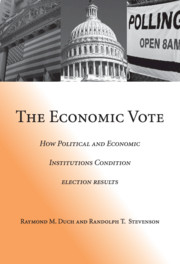Book contents
- Frontmatter
- Contents
- Preface
- 1 Introduction
- Part I Describing the Economic Vote in Western Democracies
- Part II A Contextual Theory of Rational Retrospective Economic Voting: Competency Signals
- Part III A Contextual Theory of Rational Retrospective Economic Voting: Strategic Voting
- 8 Responsibility, Contention, and the Economic Vote
- 9 The Distribution of Responsibility and the Economic Vote
- 10 The Pattern of Contention and the Economic Vote
- Part IV Conclusion and Summary
- Appendix A
- Appendix B
- Appendix C
- References
- Index
- Cambridge Cultural Social Studies
9 - The Distribution of Responsibility and the Economic Vote
Published online by Cambridge University Press: 06 July 2010
- Frontmatter
- Contents
- Preface
- 1 Introduction
- Part I Describing the Economic Vote in Western Democracies
- Part II A Contextual Theory of Rational Retrospective Economic Voting: Competency Signals
- Part III A Contextual Theory of Rational Retrospective Economic Voting: Strategic Voting
- 8 Responsibility, Contention, and the Economic Vote
- 9 The Distribution of Responsibility and the Economic Vote
- 10 The Pattern of Contention and the Economic Vote
- Part IV Conclusion and Summary
- Appendix A
- Appendix B
- Appendix C
- References
- Index
- Cambridge Cultural Social Studies
Summary
Two theoretical propositions come out of the discussion of administrative responsibility in the last chapter, each of which produces a straightforward hypothesis. The first concerns the distribution of the economic vote across parties. Parties with a greater share of the status quo distribution of administrative responsibility will receive a greater share of the economic vote than parties with a smaller share. The second concerns the overall size of the economic vote across all parties in an election. As the status quo distribution of administrative responsibility over parties becomes more equal, the overall economic vote declines.
The main task in testing these empirical hypotheses is the measurement of voters' beliefs about the share of administrative responsibility that each party holds. A variety of indicators of the status quo distribution of policy-making responsibility has been discussed in the literature: the current distribution of cabinet membership, the current distribution of cabinet portfolios, the coalition status of the government, the majority status of the government, the influence of the opposition on the government, the extent of collective cabinet responsibility, the distribution of legislative seats, the distribution of ministries specifically dealing with economic matters, and the role of the president. Furthermore, the values of these variables are so widely reported and so well known that we can assume voters' beliefs about them closely mirror the empirical reality, at least on average.
- Type
- Chapter
- Information
- The Economic VoteHow Political and Economic Institutions Condition Election Results, pp. 252 - 286Publisher: Cambridge University PressPrint publication year: 2008
- 1
- Cited by

